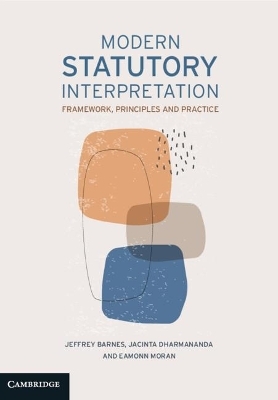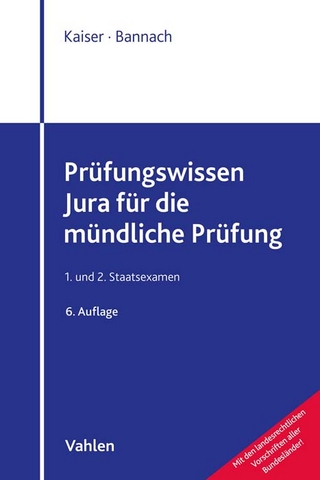
Modern Statutory Interpretation
Cambridge University Press (Verlag)
978-1-108-81602-1 (ISBN)
Statutory interpretation is both a distinct body of law governing the determination of the meaning of legislation and a task that requires a set of skills. It is thus an essential area of legal practice, education and research. Modern Statutory Interpretation: Framework, Principles and Practice is an original, clear, coherent and research-based account of contemporary Australian statutory interpretation. Written by experts in the field, the book provides a comprehensive coverage of statutory interpretation law as well as examining related areas such as legislative drafting, the parliamentary process, the modern history of interpretation, sources of doubt, and interpretation techniques. The content is structured in eight parts. Parts I-III introduce foundational matters, Parts IV-VII deal with the general principles of interpretation, and Part VIII examines special interpretative issues. Modern Statutory Interpretation is an essential resource for legal professionals, legal researchers, and students undertaking advanced courses in statutory interpretation in Australia.
Dr Jeffrey Barnes is an Associate Professor in La Trobe Law School at La Trobe University. He assisted the Law Admissions Consultative Committee in preparing the Statement on Statutory Interpretation (Law Admissions Consultative Committee, 2010). Following that involvement, he was appointed the lead author of the Council of Australian Law Deans Good Practice Guide to Teaching Statutory Interpretation (Council of Australian Law Deans, 2015). He is the editor of The Coherence of Statutory Interpretation (The Federation Press, 2019). He has written a number of other texts on the topics of statutory interpretation, legislative drafting, the legislative process and administrative law. His doctorate was on the Plain Language Movement and legislation. In addition to producing scholarly writing, he has practised law widely, including as a parliamentary counsel for the NSW Parliamentary Counsel's Office, as Associate to the Chairman of and Law Reform Officer at the Australian Law Reform Commission, as Project Officer with the Administrative Review Council, and as a Legal Member (part-time) of the Social Security Appeals Tribunal. He has also been engaged by various government agencies as a consultant on statutory interpretation. His past academic appointments include Foundation Director of Teaching and Learning at La Trobe Law School, and Co-editor of Legal Education Review. In 2009 he developed and taught an elective subject on statutory interpretation, and since 2013 has developed and taught compulsory subjects wholly devoted to statutory interpretation for LLB and Juris Doctor students. Jacinta Dharmananda is a Senior Lecturer at the Law School of the University of Western Australia ('UWA'). She has contributed to several scholarly publications on statutory interpretation, and is co-author of the Council of Australian Law Deans Good Practice Guide to Teaching Statutory Interpretation (Council of Australian Law Deans, 2015). Her work on statutory interpretation has been cited by the High Court of Australia and shortlisted for the CALD 2020 Australian Legal Research awards (Article/Chapter ECR category). In 2017 she was the recipient of a Parliamentary Library Summer Research Scholarship to undertake research on legislation at the Parliamentary Library in Canberra. She is currently completing her doctorate at the Australian National University on the relationship between the legislative process and statutory interpretation law. In 2012 she designed, developed and taught an elective subject on statutory interpretation, a subject she has since taught to LLB and Juris Doctor students at UWA. In 2022 she designed, developed and commenced teaching to all Juris Doctor students a compulsory subject devoted to the interpretation of legal instruments, with a focus on statutory interpretation. Prior to joining UWA Law School, she worked as a commercial lawyer for over a decade in private practice and in-house in Melbourne, New York, Perth, Singapore and Tokyo. Eamonn Moran PSM QC SBS is the Inspector at the Victorian Inspectorate, the key integrity body in Victoria. He commenced in that role in 2018. Immediately prior to that appointment, he was practising at the Victorian Bar and working as a consultant legislative counsel. Between 2012 and 2016 he was also a member of the Victorian Law Reform Commission. From 2008 until 2012 he was Law Draftsman in the Department of Justice, Hong Kong, and assumed primary responsibility for the development and publication of Drafting Legislation in Hong Kong: A Guide to Styles and Practices (Hong Kong Department of Justice, 2012). In 2012 he was awarded by the Hong Kong Government a Silver Bauhinia Star ('SBS') for his contribution to the development of plain language drafting in Hong Kong. He held the office of Chief Parliamentary Counsel in Victoria from 1999 until 2008. Before then he had worked as a parliamentary counsel in Victoria for more than twenty years and was appointed as Queen's Counsel in Victoria in 1998. He was awarded an Australian Public Service Medal ('PSM') in 2005 for service to legislative drafting and public law. His most recent publication was an article he contributed to The Coherence of Statutory Interpretation (The Federation Press, 2019), edited by his co-author in this work, Dr Jeffrey Barnes. Mr Moran is a Past President of the Commonwealth Association of Legislative Counsel and a Past President of Clarity International. He has spoken at numerous conferences, both in Australia and overseas, on topics related to legislation.
Part I. Background; 1. The nature of statutory interpretation; 2. A modern history of key concepts; 3. Constitutional context; Part II. The Framework of Statutory Interpretation: 4. Legislative intent; 5. The judicial duty to be independent; 6. Text-based interpretation; 7. Context; 8. Purpose; 9. Practical techniques; Part III. Working with Legislation: Broader Skills and Knowledge: 10. Legislative drafting; 11. Enactment procedure; 12. Commencement; 13. Structure and components of an Act; 14. Problem analysis: sources of doubt; Part IV. The Provision, and the Act as a Whole: 15. The language of the provision; 16. The effect of drafting styles; 17. Special categories of legislation: the interpretation of remedial, penal and revenue provisions; 18. Linguistic canons; 19. The 'always speaking' approach; 20. The scheme and components of an Act; Part V. Legislative History: 21. Legislative antecedents (evolution) including subsequent amending Acts; 22. Pre-existing common law; 23. Background facts and circumstances; 24. Extrinsic materials – pre-parliamentary and parliamentary materials; Part VI. Interpretation Acts and Other Acts of General Application: 25. Interpretation Acts; 26. Other Acts of general application; Part VII. The Wider Context: 27. Consequences; 28. The principle of legality; 29. Use of the statute book and legislation of other jurisdictions; 30. Use of precedent; 31. International treaties and materials; 32. Other common law presumptions and aids; 33. Inadmissible considerations; Part VIII. Special Interpretative Issues: 34. Remedial constructions for drafting errors; 35. Provisions in apparent conflict; 36. Statutory powers and their characterisation: discretion or duty?; 37. The effect of non-compliance with a statutory requirement; 38. Statutory reasonableness; 39. Presumption against retrospective operation; 40. Presumption against application to government and other Crown entities; 41. Presumption against extraterritorial operation; 42. Mental ingredient of statutory offences; 43. Delegated legislation; Appendix A. Glossary; Appendix B. Bibliography.
| Erscheinungsdatum | 29.06.2023 |
|---|---|
| Zusatzinfo | Worked examples or Exercises |
| Verlagsort | Cambridge |
| Sprache | englisch |
| Maße | 170 x 244 mm |
| Gewicht | 1400 g |
| Themenwelt | Recht / Steuern ► Allgemeines / Lexika |
| Recht / Steuern ► EU / Internationales Recht | |
| Recht / Steuern ► Öffentliches Recht | |
| ISBN-10 | 1-108-81602-9 / 1108816029 |
| ISBN-13 | 978-1-108-81602-1 / 9781108816021 |
| Zustand | Neuware |
| Informationen gemäß Produktsicherheitsverordnung (GPSR) | |
| Haben Sie eine Frage zum Produkt? |
aus dem Bereich


